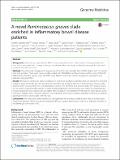A novel Ruminococcus gnavus clade enriched in inflammatory bowel disease patients
Author(s)
Hall, Andrew Brantley; Yassour, Moran; Sauk, Jenny; Garner, Ashley; Jiang, Xiaofang; Arthur, Timothy; Vatanen, Tommi; Fornelos, Nadine; Wilson, Robin; Bertha, Madeline; Cohen, Melissa; Garber, John; Khalili, Hamed; Gevers, Dirk; Ananthakrishnan, Ashwin N.; Kugathasan, Subra; Lander, Eric S.; Vlamakis, Hera; Xavier, Ramnik J.; Huttenhower, Curtis; Lagoudas, Georgia K; Blainey, Paul C; ... Show more Show less
Downloaddocument.pdf (1.540Mb)
PUBLISHER_CC
Publisher with Creative Commons License
Creative Commons Attribution
Terms of use
Metadata
Show full item recordAbstract
Background: Inflammatory bowel disease (IBD) is characterized by chronic inflammation of the gastrointestinal tract that is associated with changes in the gut microbiome. Here, we sought to identify strain-specific functional correlates with IBD outcomes. Methods: We performed metagenomic sequencing of monthly stool samples from 20 IBD patients and 12 controls (266 total samples). These were taxonomically profiled with MetaPhlAn2 and functionally profiled using HUMAnN2. Differentially abundant species were identified using MaAsLin and strain-specific pangenome haplotypes were analyzed using PanPhlAn. Results: We found a significantly higher abundance in patients of facultative anaerobes that can tolerate the increased oxidative stress of the IBD gut. We also detected dramatic, yet transient, blooms of Ruminococcus gnavus in IBD patients, often co-occurring with increased disease activity. We identified two distinct clades of R. gnavus strains, one of which is enriched in IBD patients. To study functional differences between these two clades, we augmented the R. gnavus pangenome by sequencing nine isolates from IBD patients. We identified 199 IBD-specific, strain-specific genes involved in oxidative stress responses, adhesion, iron-acquisition, and mucus utilization, potentially conferring an adaptive advantage for this R. gnavus clade in the IBD gut. Conclusions: This study adds further evidence to the hypothesis that increased oxidative stress may be a major factor shaping the dysbiosis of the microbiome observed in IBD and suggests that R. gnavus may be an important member of the altered gut community in IBD.
Date issued
2017-11Department
Massachusetts Institute of Technology. Department of Biological EngineeringJournal
Genome Medicine
Publisher
Biomed Central Ltd
Citation
Hall, Andrew Brantley et al. “A Novel Ruminococcus Gnavus Clade Enriched in Inflammatory Bowel Disease Patients.” Genome Medicine 9, 1 (November 2017): 103 © 2017 The Author(s)
Version: Final published version
ISSN
1756-994X